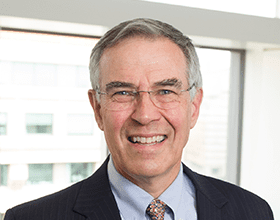Outside Voices: AAAS CEO Rush Holt, PhD
December 2018

ASHG: At its core, science drives new evidence and information that informs public life. Yet today, the idea of evidence is facing greater challenge and skepticism – climate change denial, the misuse of genetics to feed racist views, and misinformation about vaccines come to mind. As a leader of the broad scientific community, how is the American Association for the Advancement of Science (AAAS) approaching this challenge and what can individual scientists do, concretely, to help?
Dr. Holt: Whether dealing with the opioid crisis that plagues the United States, managing the introduction of driverless cars, or ensuring clean drinking water, scientific and technical evidence provides a strong foundation for making sound decisions about public issues. At a time when evidence is increasingly pushed aside by ideology and rhetoric, it appears that appreciation of science is on the decline.
AAAS is building several new initiatives to restore a reverence for evidence. The Center for Scientific Evidence in Public Issues (EPI Center) will bring clearly and strategically communicated scientific evidence on public issues to decision-makers—from policymakers to parents—and to others who influence them, when they need it most. SciLine provides timely access to trustworthy, articulate experts for journalists and other communicators producing print, broadcast, or digital stories containing science. Just last month, we launched our local and state advocacy initiative, which will aim to bring resources to help scientists be effective spokespeople for their research in their communities.
ASHG: With the elections behind us, a large class of new U.S. Congressmembers from both parties will arrive when the House and Senate return in January. As you are a former Congressman, what can scientists do in the first six months to educate Members about federal support for research and medical progress? Collectively, how do we best make a bipartisan case for sustained research investment?
Dr. Holt: Given my background, I was already convinced of the intrinsic value of federal support for research and development funding when I arrived in Congress. What I always appreciated when I was in office was hearing from my constituents who were experts their own fields. I always encourage scientists to contact their elected officials on issues of importance, but also to offer themselves as resources on the complex issues that their representatives consider on a daily basis. Scientists who talk not about themselves and their work, but about how science helps others, can be useful to a legislator on many issues, even beyond their scientific specialty.
It is also important for sitting members of Congress to educate their new colleagues about the importance of these issues and how authorizations and appropriations are made. Members of the relevant committees and member organizations—such as the Research and Development Caucus—have an important role to play in making sure that new members, particularly those without scientific backgrounds, understand the complexities.
ASHG: Like AAAS, ASHG is a global organization and nearly 30 percent of our members reside outside the U.S. What is the state of global collaboration in science? What roles do you see for scientific societies in that effort?
Dr. Holt: AAAS first pioneered the field of science and diplomacy decades ago. Science can build bridges between societies where official relationships may be strained and strengthen interactions and partnerships between the scientific and diplomatic communities. This use of scientific collaboration and communication is essential both to the advancement of science and its use for the benefit of our global society. As non-governmental organizations, scientific societies can, and must, play an important role in facilitating relationships that transcend boundaries.
ASHG: AAAS recently issued a “call to action” to address sexual harassment in science, engineering and medicine, which builds on the June 2018 National Academies report, and ASHG recently introduced an Annual Meeting Code of Conduct that sets expectations for a safe and welcoming environment. Tell us more about what you think is at the root of this issue and how the scientific community can work together to realize meaningful change.
Dr. Holt: Harassment has no place in science. Harassment is a science issue because, in addition to being a moral and humanitarian challenge, it can take on menacing forms in the scientific enterprise. AAAS has longstanding work on these issues and the institutional, cultural, and behavioral change that is needed to address them. To put an end to this epidemic, we must come together as a community to identify the root causes of the problem and to implement lasting change in our institutions to make them not simply material in a multi-cultural world, but actively supportive of fair, equitable, diverse participation.
ASHG: As you look across the scientific enterprise, what’s been most heartening to you in recent years? Where do you see real progress that we should applaud and build on?
Dr. Holt: Perhaps most encouraging to me since joining AAAS four years ago has been the unification and coordination of the scientific community. Scientific societies across all disciplinary and institutional divisions are working more closely together now than ever before, to the benefit of the entire enterprise. Our work to advance science and serve society is magnified when we speak with one voice.
